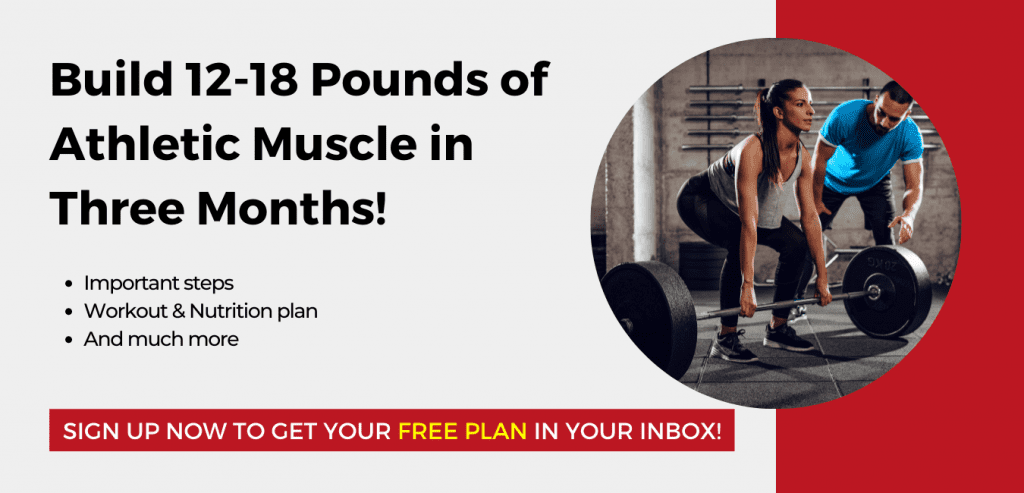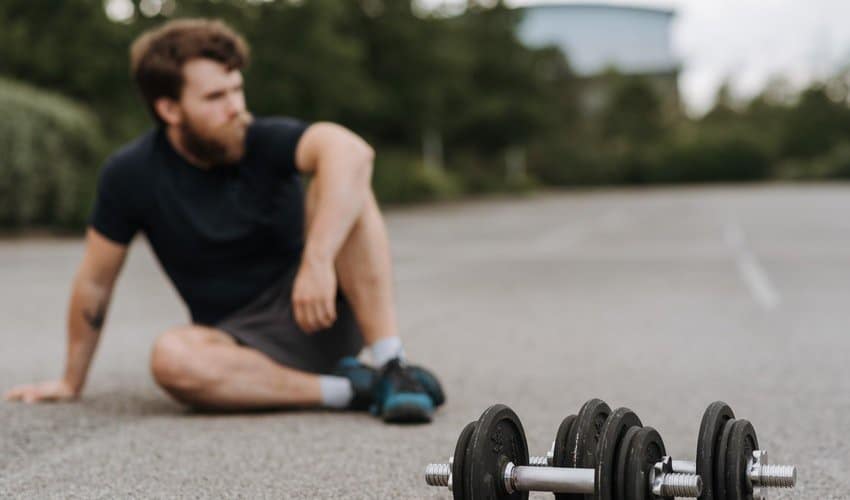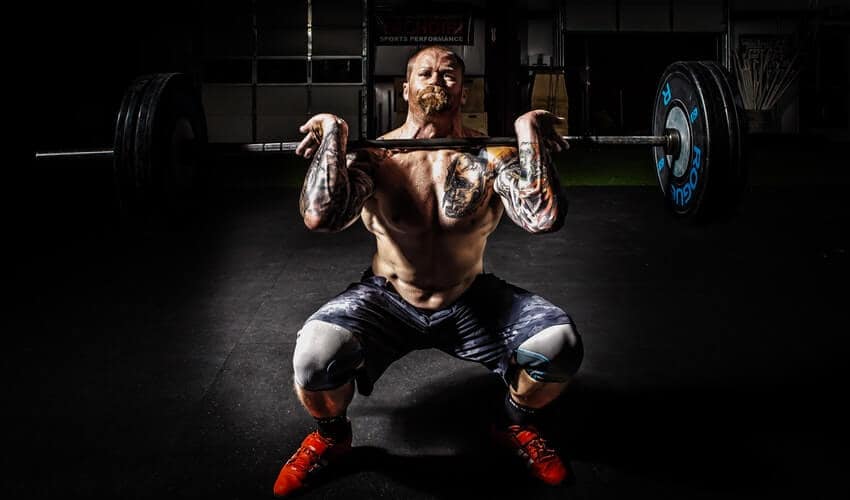If you think you only need to consume high-protein foods for building muscle, then you might be wrong somewhere.
Yes! for gaining muscle mass, you need protein, but it is equally important to eat a balanced diet (protein, carb, fat, vitamins, and minerals) for optimum muscle growth and overall health.
Here we’ll go through the thirty best muscle-building foods that you should include in your diet to boost your muscle growth and foods that also help make this process much easier.
So, let’s get started!
30 Best Muscle-Building Foods to Lean Gain
Add these foods to your diet to build quality muscle mass!
1. Eggs
Eggs are some of the most nutritious food on the planet, and it’s an excellent source of high-quality protein and inexpensive.
Eggs contain a large amount of the amino acid leucine, which is vital for muscle mass, also’s rich sources of B vitamins, vitamin D, and minerals such as zinc, iron, and copper.
Serving size: 1 to 2 whole eggs and 10-12 eggs white (depending on how much protein you want from eggs). Recommended: two whole eggs with 7-10 egg whites to gain muscle mass.
2. Salmon
Salmon is one of the most popular and nutritious food on earth and an excellent source of protein, healthy fats, and vitamins.
Salmon fish are rich in Omega-3 fatty acids, which plays an excellent role in improving muscle health and heart and brain health.
Serving size: Each 3-ounce (85-gram) serving of salmon fish contains about 17 grams of protein, almost 2 grams of omega-3 fatty acids and some essential B vitamins.
The American Heart Association (AHA) recommends eating fish at least two times a week, particularly fatty fish like salmon, lake trout, and tuna, which are high in omega-3s.
3. Chicken Breast
The chicken breast is incredibly healthy and packed of high-protein; also, it’s low in fat. The majority of chicken fat is concentrated in the skin, so chicken breasts are typically sold skinless and boneless.
Chicken breasts contain a high amount of protein and several B vitamins, especially when you’re active or workout to add some muscle mass.
Serving size: Each 3-ounce (85-gram) serving contains about 26 grams of high-quality protein.
4. Tuna
Tuna fish is a highly nutritious food for non-vegies. This food is packed with high-quality protein and, at the same time, low in fat.
Tuna is an excellent source of vitamin B12, an essential vitamin needed to make DNA. Also contain Omega-3 fatty acids and much more vitamins and minerals such as vitamin B6, vitamin D, iron, potassium, and selenium.
Serving size: A 4-ounce (113 grams) serving of white tuna contains almost 27 grams of protein, 4 grams of healthy fat.
5. Soybeans
Soybeans are among the best sources of plant-based protein and contain a decent amount of carb and fat.
Soybeans are a good source of vitamin K, iron, and phosphorus. Iron used to store and transport oxygen in your blood and muscles.
Soybeans can be a great option, especially for young women who have iron deficiency due to blood loss during menstruation.
Serving size: A 3.5 ounces (100 grams) of boiled soybeans contains 16.6 grams of protein, healthy unsaturated fats and several vitamins and minerals.

6. Greek Yogurt
Greek yogurt is an excellent source of calcium, which improves bone health. It also contains probiotics to support a healthy bacterial balance in the gut.
Greek yogurt doesn’t only contain high-quality protein, but it’s a mixture of fast- and slow-digesting protein. After a workout or before bed, having it as a snack can be beneficial for muscle growth due to its (fast and slow digesting protein) mixture.
Serving size: 8 ounces (245 grams) of Greek yogurt contains 24 grams of protein, 10 grams carbs, 5 grams of fat, and 22% of the DV and several vitamins and minerals.
7. Lean Beef
Lean beef is a great source of high-quality protein and rich in various vitamins and minerals, especially iron and zinc. To gain muscle mass, consuming lean red meat can also increase lean mass gain with weight training.
Serving size: A 3.5-ounce (100-gram) serving of broiled, ground beef with 10% fat contains 217 calories, 26 grams of protein and 12 grams of fat.
8. Turkey Breast
Turkey breast is an excellent high protein food option containing niacin, vitamin B6, and the amino acid tryptophan. Apart from these nutrients, it also contains zinc and vitamin B12, and it also contains anti-cancer properties.
The tryptophan content in turkey may help you support healthy serotonin levels in your body, which promotes alertness and a good mood.
Serving size: A 3-ounce serving of boneless, skinless turkey breast contains 26 grams of protein, one gram of fat, no saturated fat, and carb.
9. Beans
Several types of beans can be part of your diets, such as black, pinto, kidney beans, etc. These beans are excellent fibre sources and several B vitamins and high in magnesium, phosphorus, and iron.
Beans are a good source of plant-based protein, and they may play a crutial role in your long-term health and disease prevention.
Serving size: 100 grams of raw kidney beans contains 24 grams protein, 25 grams fiber, almost no fat, and around 1406 mg potassium with 60 grams of carbs.
10. Protein Powder
Protein powder can be an excellent protein option while you’re not able to fulfill your protein intake from foods alone.
Dairy protein powders, such as whey and casein, are the most popular on the market. However, there are many other options available too. This powder is the best option that you can include in your post-workout.
Serving size: Typically, one scoop of protein powder contains 24 grams of protein, 2-gram carbs, and no fat. You can find a variety of protein powders online.
11. Tilapia
Although it does not have as much omega-3 fatty acid as salmon, Tilapia is a high-protein seafood item to include in your muscle-building food list.
Tilapia is rich in protein and vitamin B12, which helps maintain our blood cells and nerves health to perform muscle gain exercises.
Serving size: A 3-ounce (85-gram) serving provides around 21 grams of protein, along with adequate amounts of vitamin B12, selenium, phosphorus, and niacin.
12. Quinoa
When consuming protein-rich foods, it’s equally important to supply sufficient fuel to energies your body throughout the day. Carbohydrate-rich food like quinoa can help to provide this energy.
Quinoa is rich in carbs, fiber, nine essential amino acids, and a decent amount of magnesium and phosphorus. Magnesium plays a vital role in our body for our muscles and nerves’ proper functioning, which are used to move every time.
Serving size: A 3.5 ounce (100 grams) cooked quinoa contains 21 grams of carbs, 4.4 grams of protein along with 2.8 grams of fiber, and a hearty amount of magnesium and phosphorus .
13. Nuts
When it comes to gaining muscle or improving overall health, it comes from a balanced diet. And fat is one of those essential macros to have in your meal.
Nuts are an excellent source of healthy fat and fiber with a decent amount of protein, omega-6 and omega-3 fats. Nuts also pack several vitamins and minerals, including magnesium and vitamin E.
Serving size: A one-ounce (28-gram) serving of Brazil nuts contains about 18 grams fat, 4 grams protein, 2 grams fiber, and a fair amount of vitamin E and Magnesium.
14. Oats
Oats are among the healthiest grains on earth and a great source of complex carbs. It will provide energy throughout the day and help you get a powerful workout session and gain muscle mass with its nutrition.
Oats are a great source of vitamins, minerals, fiber, and antioxidants. Studies show that oats have many health benefits, including muscle gain, weight loss, lower blood sugar levels, and reduced heart disease risk.
Serving size: A 3.5 ounces (100 grams) of raw oats contains 389 calories along with 17 grams of protein, 66 grams of carbs, 10 grams of fiber, and some essential vitamins and minerals.
15. Brown Rice
Brown rice is one of the most nutritious food on the planet. While you’re gaining muscle mass, brown rice is a crucial food packed with carbs, protein, fiber, and lots of vitamins, minerals, and antioxidants.
Brown rice is pack with fiber, lignans, and magnesium, which all benefit your heart health and heart disease risk and the complex carbs provide energy throughout the day.
Serving size: One cup of brown rice contains 216 calories and 44 grams of carbs, 3.5 grams of fiber, 5 grams of protein, and a wide array of vitamins, minerals, and antioxidants like iron, zinc, niacin, pyridoxine, magnesium, etc.
16. Peanut Butter
Peanut butter is rich in a variety of nutrients, and also it’s rich in calories, which makes it a great option for your muscle-building food list.
Although peanut butter is high in healthy fat, consuming them in moderation will fill your daily fat intake and minimize potential health problems. Its healthy fat is an excellent food for weight gain, glowing skin, and hair health.
Some commercial peanut butter brands often have added sugars, oils, and fats, so make sure to go for an all-natural (100%) peanut butter.
Serving size: A 2 tablespoon serving of peanut butter contains 207 calories with 18 grams of fat, 9 grams of protein, 3 grams of fiber, and several vitamins and minerals such as vitamin E, niacin, manganese, vitamin B6, magnesium, copper, etc.
17. Shrimp
Shrimp is a very nutritious food and low in calories and provides a high amount of protein, healthy fats, and lots of vitamins and minerals.
Due to its low calories with high protein, shrimp is an impressive food option for cutting or body toning. It also promotes our heart and brain health as it contains omega-3 fatty acid.
Serving size: A 3-ounce (85-gram) serving of shrimp contains 84 calories and 18 grams of protein and several vitamins and minerals such as selenium, vitamin B12, iron, phosphorus, niacin, zinc, magnesium, and it’s also a good source of omega-6 and omega-3 fatty acids.
18. Almonds
When you’re in muscle building goal, almonds are high in calories, and they can help you fill your required daily calorie intake and an impressive mass gaining snack option.
Almonds are rich in fat, fiber, and protein. They’re also full of vitamins and minerals such as iron, potassium, zinc and the B vitamins, vitamin E, calcium, niacin, thiamine and folate.
Serving size: A 30-gram serving of almonds has 13g of healthy unsaturated fats and 1g of saturated fat, 8 grams of plant protein, and a more vitamin E (7.7mg), calcium (80mg), and riboflavin (0.3mg) than any other nut.
19. Milk
Milk is an excellent source of vitamins and minerals, including potassium, vitamin D, B12, zinc, magnesium, and thiamine, which are essential nutrients for our body and muscle’s functioning.
Milk plays a vital role in our bone growth as it contains calcium, and it also provides a decent amount of protein, which helps us grow muscle mass.
Serving size: One cup (240 ml) of whole cow’s milk with 3.25% fat provides 149 calories with 7.7 grams of protein, 11.7 grams of carb, 8-gram fat, and full of nutrients like calcium, vitamin D, etc.
20. Bison
Bison meat packed with a good amount of essential nutrients, including protein, iron, selenium, zinc, and B vitamins.
Bison is a high protein and low-fat food, an excellent muscle-building food option, and it contains iron that helps in muscle growth and maintains a high energy level. And it also has zinc which promotes muscle recovery and increases your testosterone level.
Serving size: A serving of bison cooked from a raw, 113-gram (4-ounce) portion provides 124 calories along with 17 grams of protein, 6 grams of fat, and several vitamins and minerals.

21. Broccoli
Broccoli is an excellent source of protein and fiber that contains iron, potassium, calcium, selenium, magnesium, and vitamins A, C, E, K, and a good array of B vitamins.
Researchers show that broccoli contains 148% vitamin C of your RDA, which helps us faster muscle recovery from intense workouts and less stiffness the day after.
Serving size: One cup (91 grams) of raw broccoli contains around 6-gram carb, 2.5 grams of protein, 2.4 grams of fiber, and lots of other nutrients, which promotes your gut health and may reduce the risk of various diseases.
22. Cottage Cheese
Cottage cheese is a super healthy and highly nutritious food high in protein and a favorite muscle-building snack option for most athletes.
Cottage cheese is an excellent source of calcium that plays a crucial role in tooth and bone health and the prevention of osteoporosis. It’s also packed with many nutrients, such as B vitamins, calcium, phosphorus, and selenium.
Serving size: One cup (226 grams) of low fat (1% milkfat) cottage cheese provides around 163 calories and 28 grams of protein, 6-gram carb, 2-gram fat, and many vital nutrients like vitamin B12, calcium, riboflavin, selenium, folate, etc.
23. Tofu
Tofu is a good protein source containing all nine essential amino acids and a vital source of vitamins and minerals such as iron, calcium, manganese, phosphorous, magnesium, copper, zinc, and vitamin B1.
Tofu is considered a soy protein that is a high-quality plant protein and contains a good amount of calcium, and both are great for our muscle building and bone health. As this is a plant protein, it’s an excellent option for vegans and vegetarians.
Serving size: A 3.5-ounce (100-gram) serving of tofu offers 8 grams of protein, 4-gram fat, 2-gram carbs, and some essential vitamins and minerals such as calcium, selenium, phosphorus, iron, copper, zinc, and it comes with 70 calories only.
24. Pineapple
Pineapples are rich in bromelain (an enzyme), increasing the rate to absorb dietary protein in your body and reducing inflammation and muscle soreness.
Pineapples are low in calories but loaded with impressive vitamins and minerals; they are especially loaded with vitamin C and manganese and many other essential nutrients. It can be a great option for your pre or post-workout meal.
Serving size: One cup (5.8 ounces or 165 grams) of pineapple chunks provide around 22 grams of carb, 2.3 grams of fiber, 131% vitamin C of your RDA, 76% manganese of the RDA, vitamin B6, copper, thiamin, folate, etc.
25. Garlic
Garlic is a highly nutritious food that contains potent medicinal properties that reduce many diseases such as better blood pressure, lower cholesterol, reduced risk of heart diseases, better athletic performance, stronger bones, etc.
Early evidence suggests a chemical in garlic called allicin for 14 days can reduce muscle soreness after exercise in athletes. You can take it before the workout can increase your endurance and performance level.
Serving size: A 3-gram clove of garlic provides almost no (4.5) calories and few vitamins and minerals, but its health benefits are remarkable, improve the immune system, anti-cancer properties, lowering cholesterol, and much more.
26. Olive Oil
Olive oil is an exceptional ingredient for muscle building. It contains around 120 calories per tablespoon, and we know that between 20%-30% calories should come from fat in a muscle-building diet.
Olive oil contains healthy fats to stimulate protein production for muscle growth, and it also helps increase the rate of protein synthesis and promotes joint health.
Serving size: According to the US FDA, consuming 1 1/2 tablespoons per day will good for you. One serving or one tablespoon of extra-virgin olive oil contains around 120 calories along with 14 grams of fat that has 10 grams of monounsaturated fat and has some vitamin E and vitamin K.
27. Flax Seeds
Flax seeds are loaded with valuable nutrients. They are rich in omega-3 fats, lignans that may reduce the risk of cancer, dietary fiber, high-quality protein, and improve cholesterol and lower blood pressure.
Flax seeds contain eicosapentaenoic acid (EPA) and docosahexaenoic acid (DHA), which help us reduce inflammation, thereby decreasing muscle soreness and swelling.
Flax seeds are high in fiber and contain a fair amount of protein and an impressive source of healthy omega-3 fatty acid.
Serving size: One tablespoon (10 grams) of whole flax seeds provides around 55 calories along with 1.9 grams of protein, 3 grams of carb, 2.8 grams of fiber, 4.3 grams of fat, and lots of essential vitamins and minerals.
28. Chia Seeds
Chia seeds are fall in the same category as flax seeds. Chia seeds are packed with a massive amount of nutrients with low in calories.
Chia seeds are very rich in fiber, antioxidants, vitamins, minerals, and omega-3 fatty acid, which is beneficial for our heart and brain. And also, it improves digestion and gut health.
Serving size: One-ounce (28 grams) serving of chia seeds contains 11 grams of fiber, 4 grams of protein, 9 grams of healthy fat, and also has several B vitamins, calcium, manganese (30% of the RDI), phosphorus (27% of the RDI), zinc and all that supplies 137 calories.
29. Beets
Beets boast an impressive nutritional profile, and they are low in calories and fat yet high in essential vitamins and minerals such as vitamin C, B6, folate, magnesium, iron, etc.
Research shows that drinking beet juice raises nitric oxide levels in your body, increasing blood flow, improving lung function, and strengthening muscle contraction. Beet juice also helps athletes to improved cardio stamina and performance.
Serving size: A 3.5-ounce (100-gram) serving of cooked beetroot contains around 44 calories along with 1.4 grams of protein and has several vitamins and minerals.
30. Apple Cider Vinegar
Whenever you want to build muscle mass, it doesn’t only need protein; but there’re some crucial vitamins and minerals you also need to balance your diet correctly.
Apple cider vinegar is a crucial ingredient with lots of benefits, including improving digestion, lowering blood sugar levels, improving insulin sensitivity, lowering cholesterol, blood pressure, and improving heart health.
Apple cider vinegar is also helpful to reduce muscle soreness. Due to its anti-inflammatory and alkalizing properties, apple cider vinegar helps reduce muscle pain and inflammation.
Serving size: A typical dose of apple cider vinegar is 1–2 tablespoons (15–30 ml) mixed with water and can be taken before or after meals.
Conclusion
When you aim to build muscle, it’s not all about taking protein; it’s also more important to combine other nutrients.
The above mentioned some of the best muscle-building foods that give you the option to take all the nutrients (including high-quality protein) from various foods.
If your goal is to build muscle mass, I would highly recommend you download our three-month FREE muscle-building program, which will give you the exact steps of gaining muscle with a proper workout and nutrition plan.
Have any questions? Feel free to ask in the comment section below!


